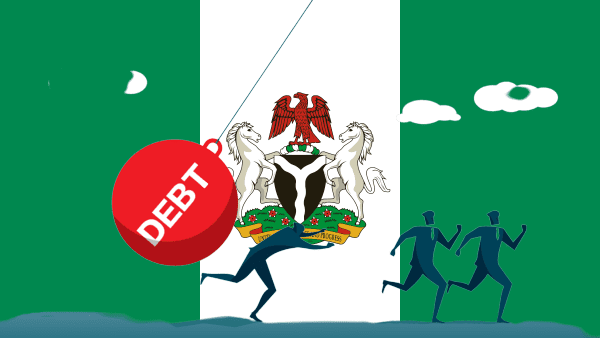Nigeria, as a populous and resource-rich nation, has faced significant challenges managing its debt burden, amid rising poverty, meeting development gaps and the worsening pressure from adverse climate change.
As a Nigerian teenager, whose future and those behind me are being mortgaged consistently by successive governments through rising international loans, with little or no tangible sustainable infrastructural development to show, there is a need for my peers and age grade to raise our voices and demand caution and change in Nigeria’s debt management system and at the same time appeal for responsible implementation of Nigeria climate commitment.
It is saddening that despite the problems caused by our anthropogenic activities on our environment, health, biodiversity and food security, our leaders in government, trade and other spaces are not paying attention and taking bold deliberate actions to turn the tides.
Pride, ignorance, greed, corruption, and socioeconomic and environmental injustices continue to be the norm all over Nigeria. More than 45 per cent of Nigerians are poor according to the 2018/19 national monetary poverty line, and 63 per cent are multidimensionally poor according to the National MPI 2022.
Nigeria hosts IFAD regional financial management summit
NIGERIA DAILY: AI And Its Impact On Students
Over time, Nigeria has been bashed by the impact of climate change – consistent flooding, massive erosion, expanding desertification, increasing heat and reducing land mass for food production and food sustainability.
The impact of climate change and poor socioeconomic decisions of the government is also evidenced in our poor development position globally, and rising debt burdens.
As of 2022, Nigeria’s debt reached an all-time high of N77 trillion. Over the past decade, Nigeria has experienced a notable surge in its debt levels. The debt to GDP ratio has more than doubled from 17.7 per cent to 37.3 per cent in 2022, and over 80 per cent of the country’s revenue is being used to settle or service debt.
Spending over 80 per cent on debt servicing leaves about 20 per cent of the country’s revenue to be thinly spread across other sectors such as health, education, security, road and infrastructure, agriculture, social welfare, etc. While many academic researchers may argue that increased borrowing increases GDP and household income, this is obviously not the case for Nigeria as it is clear from statistics and the faces of the masses that increasing government debt and loans have amounted to increasing poverty, which can only be attributed to the poor fiscal management in the country.
There are many factors fueling Nigeria’s debt crisis, the main one being fiscal mismanagement. The Nigerian government lacks fiscal discipline. The Fiscal Responsibility Act of 2007 clearly stated that the government at all levels might borrow only for “capital investment” and “human development”. This Act has been flouted over the years and efforts to amend some ambiguities in the Act have not succeeded over the year.
The relevance of the Fiscal Responsibility Act is sabotaged by the lack of strict sanctions to enforce compliance. The Fiscal Responsibility Commission, just like other oversight agencies in Nigeria lacks sanction power and is poorly supported.
The existing fiscal structure in Nigeria somewhat promotes the lack of accountability, transparency and corruption. For instance, government audit reports from the Auditor General’s office are never made for public usage or access. Even the National Assembly and Presidency over the years have ignored this lack of transparency in a public report. How do we fight corruption without public audit reports?
As the countries in the global West, make strong efforts to shift away from crude oil and gas (a lesson well learnt from the Russia-Ukraine war) and the need to cut down on carbon emissions, Nigeria needs to rethink its over-reliance on oil revenue and our vulnerability to fluctuations in global oil prices.
With international oil prices and global crude oil demand on the low, the government is left with little or no option than escalate and widen its domestic tax net on the already suffering masses and confront the dilemma of paying off accumulated debt or meeting the needs of the citizens through capital infrastructure development and social welfare.
Nigeria is largely dependent on the informal sector for GDP growth and revenue generation, especially in trade and agriculture. The impact of climate change on these sectors makes productivity a more herculean task. For instance, the economic value of the agricultural-related losses due to the 2022 flood was estimated to be about N700 billion.
The flood damaged roads, bridges, and other transport networks, making it difficult for people to travel and for agricultural goods to be transported. According to the Centre for Climate Change and Development (CCCD), climate change is already costing Nigeria $100 billion per annum. This will amount to $460 billion by 2050 if action is not taken to mitigate its effects.
The centre further estimated that from 2020 until now, climate change is already costing N15 trillion, representing 11 per cent of the GDP. By 2050 climate, change will cost N69 trillion, representing six to 30 per cent of the GDP.
By implication, therefore, if we must achieve inclusive and sustainable development, one that gives the future generation a safe ecosystem, we must grow our GDP and expand productivity today in a manner that addresses, our debt management patterns and restores our ecosystem.
The investment required to fulfil Nigeria’s developmental aspirations and climate-related obligations presents an unprecedented and formidable challenge. The estimated financing disparity to accomplish the SDGs by 2030 stands at N125 trillion, while the projected expenditure for executing the Nationally Determined Contribution (NDC) amounts to N74 trillion.
If such a fund is sourced and implemented in an accountable, open and quality manner, it has the potential to curtail the nation’s emissions by as much as 47 per cent, create new jobs and improve the overall ecosystem to a good extent.
In order to close existing gaps and alleviate the problem today, before they escalate into the future, the National Assembly should review the current institutional and legal frameworks that are relevant to debt management in Nigeria. For example, the ability to penalize and sanction violations of current fiscal laws and regulations should be granted to the Fiscal Responsibility Commission and the Debt Management Office. Lawmakers and professional local experts should carefully review loan applications of the government in manners that are open, transparent and ensure accountability and decisions should be submitted to public input and hearings.
To promote accountability and transparency in Nigeria, it is imperative to publicly disclose information such as loan terms and conditions, borrowing plans, project implementation reports and audit reports.
Nigeria could also leverage its debt situation for positive environmental outcomes. Analyzing debt-for-nature swap agreements and green finance initiatives could shed light on potential avenues for the country to address climate change while managing its debt burden.
Increased revenue production is necessary for the Ministry of Finance, Budget and National Planning and its agencies. This should involve strengthening the revenue administration and reviewing tax incentives provided to the business sector in order to improve tax compliance.
Taxes on carbon and other forms of pollution may also be used to raise revenue. In this sense, the National Council on Climate Change’s (NCCC) proposal to introduce a carbon tax policy is a good step. Progressive taxation principles that safeguard the underprivileged and low-income earners should be the guiding principles for any modifications to the tax code.
There is the need for a comprehensive understanding of the relationship between debt accumulation, deepening poverty, and climate change. We urge policymakers, international financial institutions, fiscal and environmental advocates to collaborate in finding sustainable developmental solutions. By addressing the intersection of Nigeria’s debt crisis and climate change impact, we can pave the way for a more equitable and environmentally responsible future.
Ogeri Eleri is a student at Pan-Atlantic University, Lagos

 Join Daily Trust WhatsApp Community For Quick Access To News and Happenings Around You.
Join Daily Trust WhatsApp Community For Quick Access To News and Happenings Around You.


